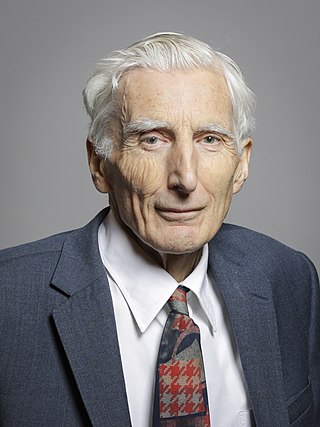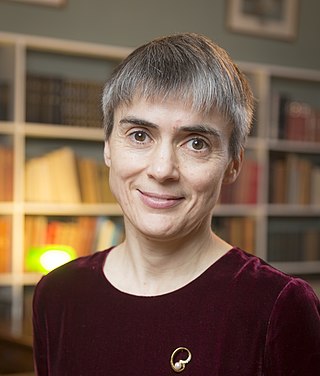Related Research Articles

Martin John Rees, Baron Rees of Ludlow, is a British cosmologist and astrophysicist. He is the fifteenth Astronomer Royal, appointed in 1995, and was Master of Trinity College, Cambridge, from 2004 to 2012 and President of the Royal Society between 2005 and 2010.

Rosamond Deborah McKitterick is an English medieval historian. She is an expert on the Frankish kingdoms in the eighth and ninth centuries AD, who uses palaeographical and manuscript studies to illuminate aspects of the political, cultural, intellectual, religious, and social history of the Early Middle Ages. From 1999 until 2016 she was Professor of Medieval History and director of research at the University of Cambridge. She is a Fellow of Sidney Sussex College and Professor Emerita of Medieval History in the University of Cambridge.

Margaret Ann Boden is a Research Professor of Cognitive Science in the Department of Informatics at the University of Sussex, where her work embraces the fields of artificial intelligence, psychology, philosophy, and cognitive and computer science.

Lawrence Charles Paulson is an American computer scientist. He is a Professor of Computational Logic at the University of Cambridge Computer Laboratory and a Fellow of Clare College, Cambridge.

John "Shôn" Eirwyn Ffowcs Williams (1935–2020) was Emeritus Rank Professor of Engineering at the University of Cambridge and a former Master of Emmanuel College, Cambridge (1996–2002). He may be best known for his contributions to aeroacoustics, in particular for his work on Concorde. Together with one of his students, David Hawkings, he introduced the far-field integration method in computational aeroacoustics based on Lighthill's acoustic analogy, known as the Ffowcs Williams–Hawkings analogy.
Ursula Hilda Mary Martin is a British computer scientist, with research interests in theoretical computer science and formal methods. She is also known for her activities aimed at encouraging women in the fields of computing and mathematics. Since 2019, she has served as a professor at the School of Informatics, University of Edinburgh.

Andrew Christopher Fabian is a British astronomer and astrophysicist. He was Director of the Institute of Astronomy, University of Cambridge from 2013 to 2018. He was a Royal Society Research Professor at the Institute of Astronomy, Cambridge from 1982 to 2013, and Vice-Master of Darwin College, Cambridge from 1997 to 2012. He served as president of the Royal Astronomical Society from May 2008 through to 2010.

Dame Henrietta Miriam Ottoline Leyser is a British plant biologist and Regius Professor of Botany at the University of Cambridge who is on secondment as CEO of UK Research and Innovation (UKRI). From 2013 to 2020 she was the director of the Sainsbury Laboratory, Cambridge.
George Petros Efstathiou is a British astrophysicist who is Professor of Astrophysics (1909) at the University of Cambridge and was the first director of the Kavli Institute for Cosmology at the University of Cambridge from 2008 to 2016. He was previously Savilian Professor of Astronomy at the University of Oxford.
The Women of Outstanding Achievement Photographic Exhibition was an annual event organised by the UKRC between 2006 and 2012, when it was subsumed into the WISE Campaign awards. It comprised creative photographs of outstanding women within science, engineering and technology (SET). Between four and seven women were chosen each year to be photographed by Robert Taylor. Nominations occurred in the Autumn of each year and the recipients were announced at a ceremony in March of the following year.
Sarah Louise Bridle is a Professor of Food, Climate and Society at the University of York. She previously served as Professor of extragalactic astronomy and cosmology in the Department of Physics and Astronomy, University of Manchester where she applied statistical techniques to the cosmic microwave background (CMB) and on the use of weak gravitational lensing in cosmology. From 2006 - 2015 she co-led weak lensing efforts with the Dark Energy Survey (DES), was co-lead of the Euclid weak lensing working group and was Large Synoptic Survey Telescope (LSST) UK Project Scientist from 2013 to 2017.

Richard Edwin Hills was a British astronomer who was emeritus professor of Radio Astronomy at the University of Cambridge.

Sarah Amalia Teichmann is a German scientist who is head of cellular genetics at the Wellcome Sanger Institute and a visiting research group leader at the European Bioinformatics Institute (EMBL-EBI). She serves as director of research in the Cavendish Laboratory, at the University of Cambridge and a senior research fellow at Churchill College, Cambridge.

Henry James Snaith is a professor in physics in the Clarendon Laboratory at the University of Oxford. Research from his group has led to the creation of a new research field, based on halide perovskites for use as solar absorbers. Many individuals who were PhD students and postdoctoral researchers in Snaith's group have now established research groups, independent research portfolios and commercial enterprises. He co-founded Oxford Photovoltaics in 2010 to commercialise perovskite based tandem solar cells.
Julia Rose Gog is a British mathematician and professor of mathematical biology in the faculty of mathematics at the University of Cambridge. She is also a David N. Moore fellow, director of studies in mathematics at Queens' College, Cambridge and a member of both the Cambridge immunology network and the infectious diseases interdisciplinary research centre.

Katherine Mary Blundell is a Professor of Astrophysics at the University of Oxford and a supernumerary research fellow at St John's College, Oxford. Previously, she held a Royal Society University Research Fellowship, and fellowships from the Royal Commission for the Exhibition of 1851 and Balliol College, Oxford.
Claire Harvey Craig is a British geophysicist, civil servant and science communicator. Since 2019, she has been Provost of The Queen's College, Oxford.
Rachel Clare Thomson is a professor of Materials Science and Engineering, and Pro Vice Chancellor of Teaching at Loughborough University. She is known for her expertise in measuring and predicting the behaviour of materials for high temperature power generation, as well as the development of higher education and research programmes.

Lisa Jayne Jardine-Wright is a physicist and educator at the University of Cambridge. She is Director of Isaac Physics, a Department for Education and The Ogden Trust supported Open Platform for Active Learning that supports school students learning physics.
The Suffrage Science award is a prize for women in science, engineering and computing founded in 2011, on the 100th anniversary of International Women's Day by the MRC London Institute of Medical Sciences (LMS). There are three categories of award:
- life sciences
- engineering and physical sciences
- mathematics and computing.
References
- 1 2 3 Anon (2017). "Crawford, Prof. Carolin Susan" . Who's Who (online Oxford University Press ed.). Oxford: A & C Black. doi:10.1093/ww/9780199540884.013.U258623.(Subscription or UK public library membership required.)
- ↑ "Fellow of the Colleges: Emmanuel College". Cambridge University Reporter No 3: Fellows of the Colleges. Cambridge University. 7 October 2010. Retrieved 24 August 2011.
- ↑ "Dr Carolin Crawford - Fellows - Contact - Emmanuel College, Cambridge". www.emma.cam.ac.uk.
- ↑ Crawford, C. S.; Hatch, N. A.; Fabian, A. C.; Sanders, J. S. (2005). "The extended H -emitting filaments surrounding NGC 4696, the central galaxy of the Centaurus cluster". Monthly Notices of the Royal Astronomical Society. 363 (1): 216–222. arXiv: astro-ph/0507627 . doi: 10.1111/j.1365-2966.2005.09463.x . ISSN 0035-8711. S2CID 13894970.
- ↑ Crawford, Carolin Susan (1988). The detection of distant cooling flows. jisc.ac.uk (PhD thesis). University of Cambridge. OCLC 53538712. EThOS uk.bl.ethos.293490. Archived from the original on 9 November 2018. Retrieved 9 November 2018.
- ↑ "Dr Carolin Crawford | Institute of Astronomy". www.ast.cam.ac.uk. Retrieved 1 March 2022.
- 1 2 "Curriculum Vitae: Carolin Crawford" (PDF). Gresham College. Archived from the original (PDF) on 3 March 2016. Retrieved 30 July 2015.
- ↑ "Gresham College Press Release 13/06/2011 | Gresham College". Gresham College. 13 June 2011. Archived from the original on 25 July 2014. Retrieved 18 July 2014.
- ↑ Anon. "Emmanuel College | Contact | Fellows". Emma.cam.ac.uk. Retrieved 18 July 2014.
- ↑ "Women of Outstanding Achievement". WISE Campaign. Archived from the original on 8 September 2015. Retrieved 30 July 2015.
- ↑ "Women of Outstanding Achievement 2009 booklet". WISE Campaign. 2 November 2009. Archived from the original on 19 September 2015. Retrieved 30 July 2015.